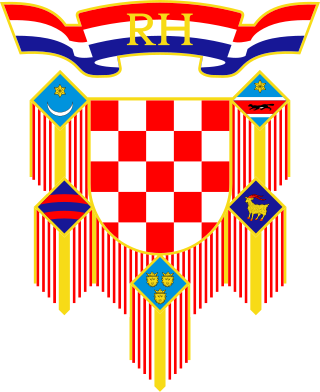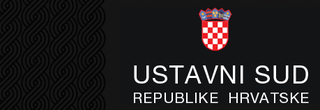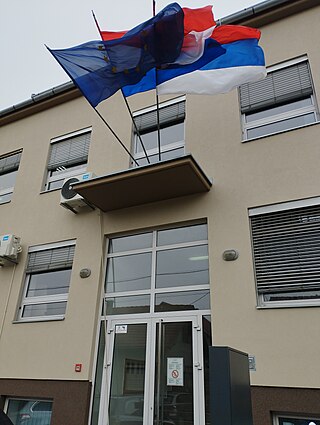The politics of Croatia are defined by a parliamentary, representative democratic republic framework, where the Prime Minister of Croatia is the head of government in a multi-party system. Executive power is exercised by the Government and the President of Croatia. Legislative power is vested in the Croatian Parliament. The Judiciary is independent of the executive and the legislature. The parliament adopted the current Constitution of Croatia on 22 December 1990 and decided to declare independence from Yugoslavia on 25 May 1991. The Constitutional Decision on the Sovereignty and Independence of the Republic of Croatia came into effect on 8 October 1991. The constitution has since been amended several times. The first modern parties in the country developed in the middle of the 19th century, and their agenda and appeal changed, reflecting major social changes, such as the breakup of Austria-Hungary, the Kingdom of Serbs, Croats and Slovenes, dictatorship and social upheavals in the kingdom, World War II, the establishment of Communist rule and the breakup of the SFR Yugoslavia.
Albania is a unitary parliamentary constitutional republic, in which the president of Albania is the head of state and the prime minister of Albania is the head of government in a multi-party system. The executive power is exercised by the Government and the prime minister with its Cabinet. Legislative power is vested in the Parliament of Albania. The judiciary is independent of the executive and the legislature. The political system of Albania is laid out in the 1998 constitution. The Parliament adopted the current constitution on 28 November 1998. Historically Albania has had many constitutions. Initially constituted as a monarchy in 1913, Albania became briefly a republic in 1925, and then a authoritarian monarchy in 1928. In 1939 Albania was invaded by Fascist Italian forces, imposing a puppet state, and later occupied by Nazi German forces. Following the partisan liberation from the Nazis in 1944 a provisional government was formed, which by 1946 had transformed into a communist one-party state. In March 1991 democracy was restored with multi-party elections.

The president of Croatia, officially the president of the Republic of Croatia, is the head of state, commander-in-chief of the military and chief representative of the Republic of Croatia both within the country and abroad. The president is the holder of the highest office in Croatia. However, the president is not the head of the executive branch as Croatia has a parliamentary system in which the holder of the post of prime minister is the most powerful person within the country's constitutional framework and everyday politics.

The Croatian Parliament or the Sabor is the unicameral legislature of Croatia. Under the terms of the Croatian Constitution, the Sabor represents the people and is vested with legislative power. The Sabor is composed of 151 members elected to a four-year term on the basis of direct, universal and equal suffrage by secret ballot. Seats are allocated according to the Croatian Parliament electoral districts: 140 members of the parliament are elected in multi-seat constituencies. An additional three seats are reserved for the diaspora and Croats in Bosnia and Herzegovina, while national minorities have eight places reserved in parliament. The Sabor is presided over by a Speaker, who is assisted by at least one deputy speaker.

The Social Democratic Party of Croatia is a social-democratic political party in Croatia. The SDP is anti-fascist, progressive, and strongly pro-European. The SDP was formed in 1990 as the successor of the League of Communists of Croatia, the Croatian branch of the League of Communists of Yugoslavia, which had governed Croatia within the Socialist Federal Republic of Yugoslavia since World War II.

The Constitution of the Republic of Croatia is promulgated by the Croatian Parliament.

The Homeland, previously known as the National Democratic Party of Germany, is a far-right Neo-Nazi and ultranationalist political party in Germany.

The Senate is the upper house of the States General, the legislature of the Netherlands. Its 75 members are elected on lists by the members of the twelve States-Provincial and four electoral colleges for the Senate every four years, within three months of the provincial elections. All provinces and colleges have different electoral weight depending on their population.
Regular elections in Croatia are mandated by the Constitution and legislation enacted by Parliament. The presidency, Parliament, county prefects and assemblies, city and town mayors, and city and municipal councils are all elective offices. Since 1990, seven presidential elections have been held. During the same period, ten parliamentary elections were also held. In addition, there were nine nationwide local elections. Croatia has also held three elections to elect members of the European Parliament following its accession to the EU on 1 July 2013.

The Constitutional Court of the Republic of Croatia is an institution that acts as the interpreter and guardian of the Croatian Constitution and which monitors the conformity of laws with the Constitution as well as protection of human rights and freedoms of citizens that are guaranteed by the Constitution. It is considered to be de facto the highest judicial authority because it can overturn Supreme Court decisions on the basis of constitutional breaches. It is not considered as being part of the judicial branch of government, but rather a court sui generis, and it is therefore often colloquially referred to as a "fourth branch of government", alongside the traditional model of tripartite separation of powers into the executive, legislative (Parliament) and judicial branches.

Josip "Joža" Manolić was a Croatian politician and communist revolutionary during World War II in Yugoslavia. He served as a high-ranking official of the Yugoslav State Security Administration and later as Prime Minister of Croatia, from 24 August 1990 to 17 July 1991. He was the last prime minister of Croatia as a constituent republic of Yugoslavia, as the country formally declared its independence during his term, on 25 June 1991. Following his brief term as prime minister, Manolić served as the first Speaker of the Chamber of Counties, the then upper house of the Croatian Parliament, from 1993 until 1994.

Dražen Budiša is a Croatian politician who used to be a leading opposition figure in the 1990s and a two-time presidential candidate. As president of the Croatian Social Liberal Party through the 1990s he remains to date the only Leader of the Opposition not to have been from either the Croatian Democratic Union or the Social Democratic Party.

Parliamentary elections were held in Croatia on 3 January 2000 to elect members of the Chamber of Representatives.

The Parliament of Yugoslavia was the legislature of Yugoslavia. Before World War II in the Kingdom of Yugoslavia it was known as the National Assembly, while in the Socialist Federal Republic of Yugoslavia the name was changed to Federal Assembly. It functioned from 1920 to 1992 and resided in the building of the House of the National Assembly which subsequently served as the seat of the Parliament of Serbia and Montenegro and since 2006 hosts the National Assembly of Serbia. The Federal Assembly was the highest organ of state power and the only branch of government in the country, with all state organs subservient to it under the principle of unified power as it was a one-party state, with the League of Communists of Yugoslavia as the sole legal party in the country. Most of the Federal Assembly's actions simply rubber stamp the party's decisions.

Rivers of Justice is a centre-left political alliance in Croatia. Gathered around the Social Democratic Party of Croatia (SDP), the coalition was originally formed in 2010 as the Kukuriku coalition. This somewhat facetious name meaning 'cock-a-doodle-doo', taken from a restaurant of the same name in Kastav where the coalition leaders first convened in July 2009, became well known and was eventually taken as the coalition's official name. The coalition originally consisted of four centrist and centre-left parties in the Croatian Parliament: the Social Democratic Party of Croatia (SDP), Croatian People's Party – Liberal Democrats (HNS-LD), Croatian Party of Pensioners (HSU) and Istrian Democratic Assembly (IDS). The coalition won an absolute majority of seats in the 2011 parliamentary election and successfully formed a government led by Zoran Milanović (SDP).

The Joint Council of Municipalities in Croatia is an elected consultative sui generis body which constitutes a form of cultural self-government of Serbs in the eastern Croatian Podunavlje region. The body was established in the initial aftermath of the Croatian War of Independence as a part of the international community's efforts to peacefully settle the conflict in self-proclaimed Eastern Slavonia, Baranya and Western Syrmia. The establishment of the ZVO was one of the explicit provisions of the Erdut Agreement which called upon the United Nations to establish its UNTAES transitional administration.

Parliamentary elections were held in Romania on 9 December 2012. The Social Liberal Union (USL) co-led by former Prime Minister Victor Ponta won an absolute majority in both the Chamber of Deputies and the Senate. At the time of the elections, despite the severe weather in several parts of the country, the turnout was approximately 42%, slightly higher than the last parliamentary elections held in 2008 which saw a turnout of 39%.

The Constitutional Act on the Rights of National Minorities in the Republic of Croatia is constitutional law which defines rights of national minorities in Croatia. It is one of in total three Constitutional Acts in the Croatian legal system, with the other two being the Constitutional Act on Implementation of the Constitution of Croatia and the Constitutional Act on the Constitutional Court of Croatia. In its current form, the Act entered into force on 23 December 2002. Its earlier version, under the title Constitutional Act on National and Ethnic Communities or Minorities was passed in December 1991 as a precondition of the international community for the recognition of Croatian independence from the Socialist Federal Republic of Yugoslavia. The Act is hierarchically under the Constitution of Croatia and must comply with it, but above ordinary state laws and decisions, and above statutes and decisions of lower levels of government, which all must be in accordance with this law. Additionally, two special laws were created to define rights regarding education in minority languages and specific rights on the usage of minority languages in public life. Additionally, the Constitution of Croatia itself has articles directly relating to the protection of national minorities, and lists traditional minorities in Croatia.

A general election was held in the U.S. state of Illinois on November 8, 2022. The elections for United States Senate and United States House of Representatives, Governor, statewide constitutional officers, Illinois Senate, and Illinois House were held on this date.

The 2022 Michigan elections were held on Tuesday, November 8, 2022 throughout Michigan. The Democratic Party made historic gains, taking full control of state government for the first time since 1983. Democrats won control of the Michigan House of Representatives for the first time since 2008, and the Michigan Senate for the first time since 1984. Additionally, incumbent Democratic governor Gretchen Whitmer won reelection by a comfortable margin, with Democrats sweeping every statewide office. Furthermore, the Democrats maintained control of seven seats in the U.S. House of Representatives, while the Republican Party took a net loss of one seat. The elections in Michigan were widely characterized as a "blue wave".

















